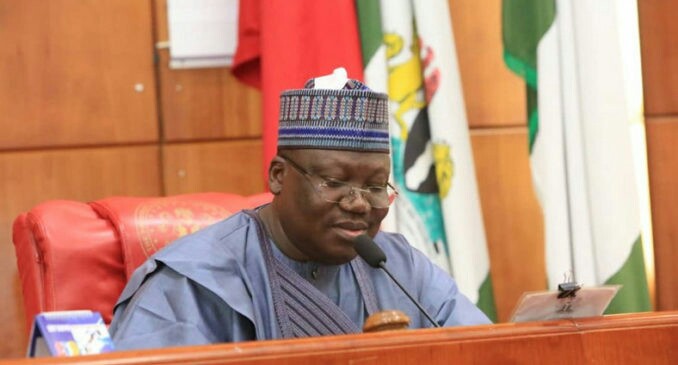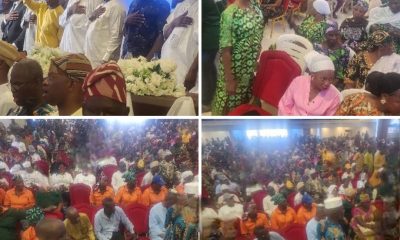News
Lawan Rejects Call For Unicameral Legislature, Says Senate Is A Leveller

…Expresses Concern Over Low Remittances By Revenue Generating Agencies
The President of the Senate Dr. Ahmad Lawan, has rejected the call for the adoption of unicameral legislature in Nigeria.
Lawan stated this yesterday in Abuja at the third convocation of the Nigerian Institute of Legislative and Development Studies (NILDS), University of Benin, Benin City, Edo State.
Sundiata Post recalls that the former governor of Imo State, Rochas Okorocha has at plenary before the Senate adjourn for budget defence, proposed the scrapping of the House of Representatives to reduce cost of governance in the country.
However Lawan said Nigeria adopted consciously bicameral National Assembly because of the peculiarity of the country, adding that the diversity and the ethnic composition of the country requires a system that would ensure equity and value.
Lawan explained that Bayelsa State with five members of the House of Representatives could not compete with Kano that has 24 in the House, but added that in the Senate, Kano has three senators just like Bayelsa, describing it as a leveller.
According to him, “So, it is a conscious decision and design to ensure that everybody is represented. We need a bicameral legislature in Nigeria. What we should be looking out for is productivity.
“Members of the National Assembly must justify the expenditure on them and that is what we should be concerned with. We must be productive and we are on the way to proving that we are going to be productive.”
The Senate president noted that the members of the National Assembly have committed themselves more than ever before to make sure that budget defence is completed on time.
He noted that the target of October 29th as the last date for budget defence remains sacrosanct, adding that from the 30th of October to the 5th of November, all committees are expected to defend their budget before the Appropriation Committees of both the Senate and the House.
The Senate president said that the National Assembly is desirous and determined to ensure that the budget is laid on 28th of November in both chambers, while also ensuring that the budget is passed before the end of December.
Going forward, Lawan said that the lawmakers would ensure that the budget is implemented, though he acknowledged that availability of revenue is the main constraint in budget implementation.
He stated: “Today, Nigeria is challenged by availability of revenue. We can pass the budget in record time, but when it comes to implementation, we have to be subject to how much we are able to gather. Nigeria has a lot of revenue, but majority of the revenue generating agencies don’t remit most of these revenues and have forced the government to resort to borrowing.”
The Senate president said the time has come for the National Assembly to continually engage with the revenue generating agencies to know what their challenges are.
He said once they have target, the National Assembly would ensure that they meet the target and when they are not able to meet the target, they would find out why to know if the problem is institutional problem or a systemic issue.
Lawan added: “We have so many areas of revenue generation everyday and yet, we hardly see these revenues. I think it is a big challenge to the National Assembly and this National Assembly will go all the way, take the bull by the horn and look for our revenues where ever they are.
“We don’t have to continue to borrow. When you are a little poorer, you start looking for who is owing you. Now we have problem and if we had surplus before and ignored so many things, today, there is paucity of fund and so every single kobo counts and we will look for that where ever it is.”
Earlier, the DG of NILDS, Prof. Abubakar Sulaiman, said that in the first five academic sessions since inception, especially from 2013/2014-2018/2019, a total of 271 students enrolled for various programmes.
He said this year, 65 students would be conferred with various degrees broken down to 28 Master’s in Legislative Studies, 15 Master’s in Legislative Drafting and 22 Master’s in Parliamentary Administration.
-

 Education4 days ago
Education4 days ago2026 UTME: JAMB Rules Out Extension As Registration Ends In 17 days
-

 News3 days ago
News3 days agoOsun 2026: Former SSG Adeoti, Thousand Of Supporters Declare Support For Adeleke
-

 News4 days ago
News4 days agoNigerians Cannot Afford Another Glitch: Fadojoe Insists on Real-Time Electronic Transmission of Election Results
-

 News4 days ago
News4 days agoWhy Nigerians Fear Hospitals More Than Illness By Boluwatife Adedokun



1 Comment